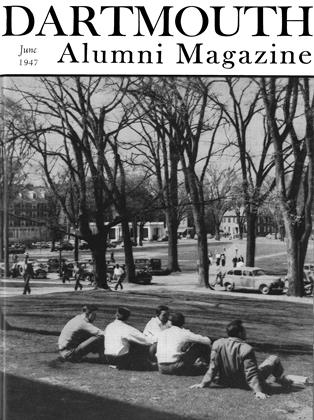Coach Ellie Noyes has been laboring hard this spring, but the material is just not there (as it was last year) to respond to his ministrations. In addition, he has been handicapped by injuries to several of his key men (among them Captain Ken Coyne who injured his leg severely just before the Penn Relays). In the latter athletic carnival, the Indians were able to produce a lone second place in the relays and individual events. Jim Burnham, brother of the famed Don, finished second in the 16-pound hammer with a heave of 156 feet inches. With the principal Green relay teams fatally stricken by the injury of middle-distance runner Coyne, they finished out of the money in each case.
A week later, the Dartmouth team finished fifth in a pentagonal meet held at West Point and involving Missouri, Army, Harvard, Columbia, and Dartmouth, with the teams finishing in that order. The Green was able to amass only a meager 11 points from Jim Burnham's third in the hammer, Walt Newman's fourth in the 220 and fifth in the hundred, Bill Kleist's fourth in the broad jump, Bill Kimball's fifth in the high hurdles, and a fourth in the mile relay.
The Friday afternoon of Green Key Weekend, Dartmouth played host to Holy Cross and, with frigid blasts from the north practically blowing the runners back into their starting, holes, managed to nose out the Crusaders by a score of 79 1/6 to 60 5/6. Because of the cold weather, no very startling times were produced in the running events, nor were the jumpers and throwers (with one exception) able to do anything very much in their specialties. Not notably powerful in most of the field events, the Green put over the victory largely through strength in the running events. The only outstanding performance (and this one was really outstanding) was the 160 feet 4 inches which Jim Burnham tossed the 16-pound hammer. This effort broke a College record of long standing and continued the able work which this athlete has exhibited all through the season.
The week following saw the team compete at Cambridge in the "Ivy League Intercollegiates," otherwise and more learnedly known as the Nonagonal Games. The reason for this impressive title is that the yearly contest, formerly called the Heptagonals (from the Greek heptagonos, meaning seven-cornered), was recently augmented by the addition of Army and Navy. This increased complexity was apparently too much for the Green, who yielded to their more cultured rivals all along the line and finished in last place with 121/8 points. Harvard won the meet handily by virtue of her strength in the field events, with Navy, Army, Pennsylvania, Yale, Columbia, Princeton, and Cornell leading Dartmouth in combined totals and in that order. The points of the Green were gleaned as follows: Roger Hillas tied for fifth in the high jump; Jim Burnham copped a fourth in the hammer; Bill Kimball took a third in the high hurdles and Eddie Miller a fourth in the lows; Walt Newman finished fifth in the 100-yard dash; and Stan Waterman took a second in the two-mile. That was all.
STARS FELL ON SQUANTUM NAVAL AIR STATION: West Point gridiron stars, Ail-Americans Arnold Tucker, left, and Glenn Davis, right, chat with Big Green fullback Bob McLaughry '44 at the Navy air base. McLaughry, a Marine Corps Reserve Captain, was getting in weekend flight time and the cadets were on their way to a YMCA rally.
 View Full Issue
View Full Issue
More From This Issue
-
 Article
ArticleA RIVER CAMPUS?
June 1947 By PETER E. COSTICH '47 -
 Class Notes
Class Notes1919
June 1947 By J. K. HUNTINGTON, MAX A. NORTON -
 Class Notes
Class Notes1918
June 1947 By ERNEST H. EARLEY, DONALD L. BARR -
 Class Notes
Class Notes1921
June 1947 By DONALD C. MIX, ROBERT M. MACDONALD -
 Article
ArticleTHE TIRED VETERAN
June 1947 By EDWARD F. EUBANKS '44 -
 Class Notes
Class Notes1943
June 1947 By FRED F. STOCKWELL, WILLIAM T. MAECK
Francis E. Merrill '26
-
 Sports
SportsFALL SPORTS
December 1945 By Francis E. Merrill '26 -
 Sports
SportsBASKETBALL
February 1946 By Francis E. Merrill '26 -
 Sports
SportsCORNELL 21, DARTMOUTH 7
December 1946 By Francis E. Merrill '26 -
 Sports
SportsOLYMPIC HOCKEY
February 1948 By Francis E. Merrill '26 -
 Sports
SportsTHE CENTERS
October 1948 By Francis E. Merrill '26 -
 Sports
SportsSOCCER
November 1949 By Francis E. Merrill '26
Sports
-
 Sports
SportsCOUNCIL SECURES DENISHA AS COACH OF HOCKEY TEAM
January, 1925 -
 Sports
SportsIN MEMORIAM
OCTOBER 1931 -
 Sports
SportsWith Big Green Teams
October 1950 By Bernard G. Sykes '51 -
 Sports
SportsIntramurals
May 1935 By C. E. Widmayer '30 -
 Sports
SportsTENNIS
June 1948 By Francis E.Merrill '26 -
 Sports
SportsHockey Successes
FEBRUARY 1929 By Phil Sherman

